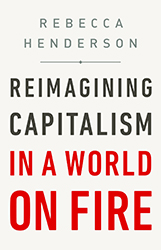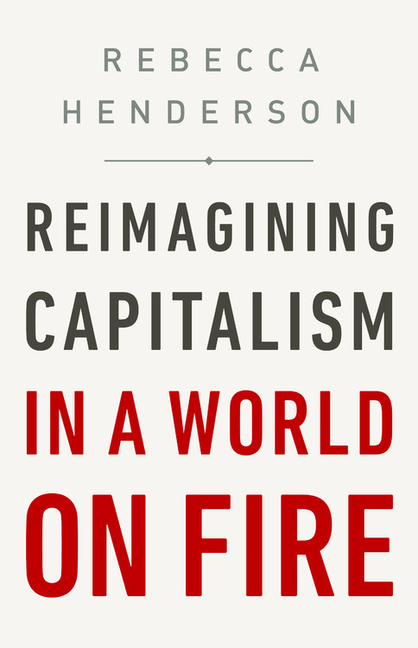Reimagining Capitalism in a World on Fire
May 01, 2020
No, capitalism didn't cause this mess. But maybe we can use the many crises we are in as an opportunity to reimagine it so it stops contributing to the problems we face.
 Reimagining Capitalism in a World on Fire by Rebecca Henderson, PublicAffairs
Reimagining Capitalism in a World on Fire by Rebecca Henderson, PublicAffairs
So, how is everyone doing? Me, I live in an American city, which means I live with and near a lot of people who lean to the left politically, which means that my Facebook feed has been full of people who have posted sentiments and memes about how “capitalism did this” during this pandemic. Which is fine. I get it. But it also feels similar to people crying socialism when we try to expand healthcare or repair the social safety net, and it’s just not exactly accurate. Or, if it is, we should also give it credit for pulling about a billion people out of extreme poverty over the past 25 years. Or, maybe—as Rebecca Henderson writes in Reimagining Capitalism in a World on Fire it’s why the “fifty richest people … own more than the poorer half of humanity, while more than six billion live on less than $16 a day.” Our relationship status with capitalism is complicated, to say the least. That makes Henderson’s book essential. As she asks:
What is capitalism?
One of humanity’s greatest inventions, and the greatest source of prosperity the world has ever seen?
A menace on the verge of destroying the planet and destabilizing society?
It is, in short, a bit of—maybe a lot of—both. Henderson’s book is an indictment of the single-minded focus on shareholder value maximization we’ve operated our economy on for the past four decades (summed up by a brilliant cartoon that read “Yes, the planet got destroyed, but for a beautiful moment in time we created a lot of value for shareholders”) and a celebration of what business is really capable of. She insists that “In its current incarnation, our focus on shareholder value maximization is an exceedingly dangerous idea, not just to the society and the planet, but also to the health of business itself,” but also that “if we decide to rebuild our institutions, build a completely circular economy and halt the damage we’re doing to the natural world, we can.” And she is right. We can do this. We can restructure our economy so that we’re not subsidizing the worst behavior, not ignoring the so called “externalities” that make cheap energy, fast food, fast fashion, and the pace of our lives in general so unsustainable. Henderson takes on the three greatest challenges we face today—massive environmental degradation, economic inequality, and institutional collapse—in a way that provides much-needed hope that we can do things differently. And what better time is there than now? A few months ago, the cost of a Green New Deal or universal health care seemed exorbitant. Now, honestly, it just seems irresponsible not to at least try. There have been more than 26 million Americans that have lost their job since this began. They need work and health care, and this country needs to rebuild its infrastructure, and I don’t think Elon Musk or Mark Zuckerberg are coming to the rescue.
I have been feeling super unproductive lately. It’s really hard to concentrate. My wife is usually the more stressed out one in our relationship. She is a planner, and a doer, and just really ambitious in a way that I’m not. She is also a freelance photographer, and can’t go out and chase work during a safer at home order like she usually does. I thought that would be the main stress during this time, but she has become our mostly calm center in the midst of this storm. I’m often a mess. I live more in the moment, and this moment is hard. I find myself sitting here reading a book about Reimagining Capitalism in a World on Fire and trying to make sense of a world that just doesn’t make a whole lot of sense right now, that didn’t make much sense before we were forced to stop and think about it, to literally see things more clearly when we look out our window because the air is clearer when we’re not pouring so much pollution into the air, and it’s scrambling my brain.
I saw a social media post from a friend last night about how if some of these protestors against the stay-at-home orders toting guns around looked like him, a black man, the photos wouldn’t end up on Facebook, he’d just end up dead. Actually, calling him a friend might be an overstatement other than the fact that we’re friends on Facebook. Like, we’re cool and all but I’ve only met him a handful of times when he’s been home on leave, because he is active military, in the Navy, actually protecting this country. And these dunderheads protesting public health measures, calling themselves “patriots,” are going to end up getting people killed. People are talking about how much we need to reopen the economy, but Wisconsin just had its largest increase in confirmed cases yesterday, in part because we held an in person election in the middle of a global pandemic. It just doesn’t make sense. It actually really hurts, and I cry about it kind of a lot. It makes more sense to just say “capitalism did this,” but we shouldn’t fall for that, either. Business can be better, but it also requires us to be able to trust our government and its proper role in our lives again. It requires the government to be more competent and actually play that role again. Henderson uses the example of Denmark to show how “business can play a central role in framing policy without subverting the democratic process.”
Business is an important and active voice in the conversation, but it does not seek to control either the process or the end point. Its first priority is the health of the country, not immediate financial returns. And for over a hundred years this commitment has been fundamental to its success.
It used to be to ours, as well, but instead of the kind of social welfare state that most other industrial economies set up after World War II, we opted to put that responsibility on corporations, and they have decided to largely shirk that responsibility over time in favor of larger returns for shareholders. So the world was on fire before this pandemic hit. As Henderson writes:
The roots of our current predicament are fear and separateness. We fear we will never have enough. We feel that we are separate and alone. But we are not.
We are still not. Not really. The political potential of this moment is great. What most of us are all doing is great. If you would have told me a few months ago that we’d have the largest outbreak in the world and the president would suggest we ingest disinfectant and ultraviolet light into our bodies, I would have told you you’re crazy. But I would have thought it even more unlikely that we’d be able to suspend our normal way of living, and upend the economy, and that Congress would agree to send out $2.2 trillion in relief so quickly to save the lives of a very small fraction of our population and give our healthcare workers a chance at staying ahead of this. It is all really fucking beautiful and breathtaking in so many ways. As Anand Giridharadas, author of Winners Take All, always reminds us, the original Gilded Age was followed by the Progressive era. Hopefully we can do it again, because it’s what we need. I am not an anti-capitalist. I am just against letting the world burn to increase shareholder profits. I’m against running our economy like a Ponzi scheme and pretending it’s a free market. I am for Reimagining Capitalism in a World of Fire, and Rebecca Henderson helps show us how.
And, in the meantime, the weather is nice and things are starting to bloom here in Milwaukee. I’m going to take my kids on a walk outside after lunch, talk with the neighbors at a safe distance, and look at some pretty trees before getting back to work. And I'll try to write a more straightforward, normal book review next week.



